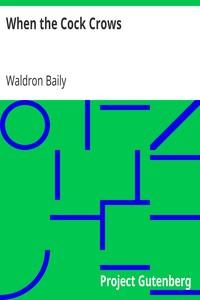Read this ebook for free! No credit card needed, absolutely nothing to pay.
Words: 54958 in 12 pages
This is an ebook sharing website. You can read the uploaded ebooks for free here. No credit cards needed, nothing to pay. If you want to own a digital copy of the ebook, or want to read offline with your favorite ebook-reader, then you can choose to buy and download the ebook.


: Maids Wives and Bachelors by Barr Amelia E - Women Social and moral questions; Women Social conditions; Marriage; Single women; Wives
her send her emotions to the newspapers; an editor is a far more prudent confidant than her very dearest friend.
Really, the day for letter-writing is past. As an art it is dead, as convenience it remains; but it has lost all sentiment. Even Madame de S?vign? could not be charming on a postal card, and for genuine information the general idea is to put it into twenty words and send it by telegraph. So, then, it is a good thing for young women to get over, as soon as possible, the tendency of their years to sentimental letter-writing. They will thus save themselves many a heart-ache in the present and many a fear for the future. For if they do not write letters they cannot feel hurt because they are not answered. They cannot worry because they have said something imprudent. They will not make promises, in the exaltation of composition, which they will either break or hate to keep when they are in their sober senses. They will also preserve their friendships longer, for they will not deprive them altogether of that charm which leaves something to the imagination.
Of course there are yet such things as absolutely necessary letters; and these, in their way, ought to be made as perfect as possible. Fortunately, perfection in this respect is easily attainable, its essentials being evident to all as soon as they are stated. First, a letter which demands or deserves the attention of an answer, ought to have it as promptly as if we were paying a bill. Second, we ought to write distinctly, for bad handwriting represents a very dogged, self-asserting temper,--one, too, which is unfair, because if we put forward our criticisms and angularities in a personal meeting, they can be returned in kind, but to send a letter that is almost unintelligible admits of no reprisal but an answer in some equally provoking scrawl. Even if the writing is only careless, and may be read with a little trouble, we have no right to impose that extra trouble. Third, it is a good thing to write short letters. The cases in which people have written long letters, and not been sorry for having done so, are doubtless very rare. No one will ever be worse for just saying plainly what she has to say and then signing her name to it plainly and in full. For a name half signed is not only a vulgarity, it indicates a character unfinished, uncertain, and hesitating.
There is a kind of correspondence which is a special development of our special civilization, and which it is to be hoped will be carefully avoided by the young woman of the future,--that is, the writing of letters begging autographs. A woman who does this thing has a passion which she ought immediately to arrest and compel to give an account of itself.
If she did so, she would quickly discover that it is a mean passion, masquerading in a character it has no right to, and no sympathy with. An autograph beggar is a natural development, though not a very creditable one. She doubtless began her career of accumulation with collecting birds' eggs in the country, where they could be got for nothing. Butterflies were probably her next ambition. Then perhaps that mysterious craze for postage stamps followed. After such a training, the mania for autographs would come as a matter of course. And the sole and whole motive of the collecting business is nothing at all but the vulgar love of possessing, and especially of possessing what costs nothing.
It is amusing and provoking to notice the air of complaisance with which some of these begging epistles are suffused. The writers seem incapable of conceiving statesmen, artists, and authors who will not be as pleased to give as they are to ask. But in reality, a man or a woman, however distinguished, who feels a request for his or her autograph to be a compliment, is soaked in self-conceit, and the large majority certainly do look upon such requests as simply impertinent begging letters. The request, indeed, carries an affront with it, no matter how civilly it may be worded, as it is not that particular autograph that is wanted, for the beggars generally prefix as an excuse the bare-faced fact that they have already begged hundreds. Certainly no self-respecting woman will care to put herself among the host of these contemptible seekers after a scrap of paper.
Speaking broadly, a woman's character may be in many respects fairly gauged by her habits on the subject of letter-writing; as fairly, indeed, as we may gauge a man's by his methods of dealing with money. If we know how a man gets money, how he spends it, how he lends it, borrows it, or saves it, we have a perfect measurement for his temper and capabilities. And if we know how a woman deals with her letters, how many she gets, how many she sends, how long or how short they are, if they are sprawly and untidy, or neat and cleanly, and how they are signed and sealed, then we can judge her nature very fairly, for she has written herself down in an open book, and all who wish may read her.
Flirts and Flirtation
Flirting is the product of a highly civilized state of society. People in savage, or even illiterate life have no conception of its delicate and indefinable diplomacy. A savage sees a woman "that pleases him well," pays the necessary price for her, and is done with the affair. Jane in the kitchen and John in the field look and love, tell each other the reason why, and get married. "Keeping company," which is their nearest approach to flirtation, has a definite and well-understood end in view, the approaches to which are unequivocal and admit of no other translation.
Flirts are of many kinds. There is the quiet, "still-water" flirt, who leads her captives by tender little sighs and pretty, humble, beseeching ways; who hangs on every word a man says, asks his advice, his advice only, because it is so much better than any one else's. That is her form of the art, and a very effective one it is.
Again, the flirt is demonstrative and daring. She tempts, dazzles, tantalizes her victims by the very boldness with which she approaches that narrow but deep Rubicon dividing flirting from indiscretion. But she seldom crosses it; up to a certain point she advances without hesitation, but at once there is a dead halt, and the flirtee finds that he has been taken a fool's journey.
There are sentimental flirts, sly little pusses, full of sweet confidences and small secrets, and who delight in asking the most suggestive and seductive questions. "Does Willy really believe in love marriages?" or, "Is it better to have loved and lost than never to have loved at all?" etc.
Free books android app tbrJar TBR JAR Read Free books online gutenberg
More posts by @FreeBooks









